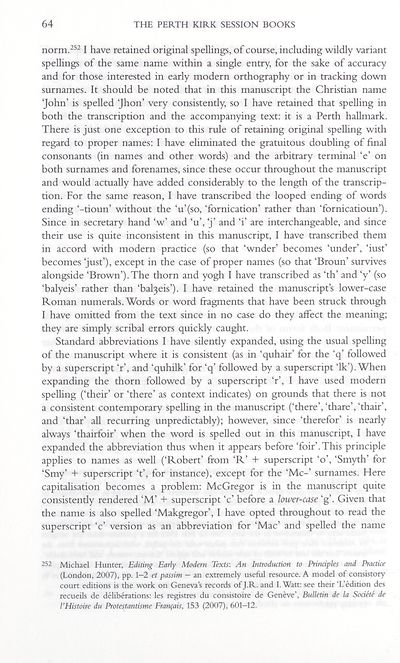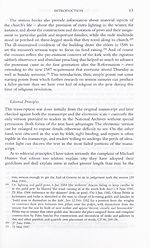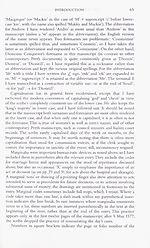Series 6 > Perth Kirk Session books, 1577-1590
(79) Page 64
Download files
Complete book:
Individual page:
Thumbnail gallery: Grid view | List view

64
THE PERTH KIRK SESSION BOOKS
norm.252 I have retained original spellings, of course, including wildly variant
spellings of the same name within a single entry, for the sake of accuracy
and for those interested in early modern orthography or in tracking down
surnames. It should be noted that in this manuscript the Christian name
‘John’ is spelled Jhon’ very consistently, so I have retained that spelling in
both the transcription and the accompanying text: it is a Perth hallmark.
There is just one exception to this rule of retaining original spelling with
regard to proper names: I have eliminated the gratuitous doubling of final
consonants (in names and other words) and the arbitrary terminal ‘e’ on
both surnames and forenames, since these occur throughout the manuscript
and would actually have added considerably to the length of the transcrip¬
tion. For the same reason, I have transcribed the looped ending of words
ending ‘-tioun’ without the ‘u’(so, ‘fornication’ rather than ‘fornicatioun’).
Since in secretary hand ‘w’ and ‘u’, ‘j’ and ‘i’ are interchangeable, and since
their use is quite inconsistent in this manuscript, I have transcribed them
in accord with modern practice (so that ‘wnder’ becomes ‘under’, ‘iust’
becomes ‘just’), except in the case of proper names (so that ‘Broun’ survives
alongside ‘Brown’). The thorn and yogh I have transcribed as ‘th’ and ‘y’ (so
‘balyeis’ rather than ‘baljeis’). I have retained the manuscript’s lower-case
Roman numerals. Words or word fragments that have been struck through
I have omitted from the text since in no case do they affect the meaning;
they are simply scribal errors quickly caught.
Standard abbreviations I have silently expanded, using the usual speUing
of the manuscript where it is consistent (as in ‘quhair’ for the ‘q’ followed
by a superscript V, and ‘quhilk’ for ‘q’ followed by a superscript ‘Ik’). When
expanding the thorn followed by a superscript Y, I have used modern
spelling (‘their’ or ‘there’ as context indicates) on grounds that there is not
a consistent contemporary spelling in the manuscript (‘there’,‘thare’,‘thair’,
and ‘thar’ all recurring unpredictably); however, since ‘therefor’ is nearly
always ‘thairfoir’ when the word is spelled out in this manuscript, I have
expanded the abbreviation thus when it appears before ‘foir’.This principle
applies to names as well (‘Robert’ from ‘R’ + superscript ‘o’, ‘Smyth’ for
‘Smy’ + superscript Y, for instance), except for the ‘Me-’ surnames. Here
capitalisation becomes a problem: McGregor is in the manuscript quite
consistently rendered ‘M’ + superscript ‘c’ before a lower-case ‘g’. Given that
the name is also spelled ‘Makgregor’, I have opted throughout to read the
superscript ‘c’ version as an abbreviation for ‘Mac’ and spelled the name
252 Michael Hunter, Editing Early Modem Texts: An Introduction to Principles and Practice
(London, 2007), pp. 1-2 et passim - an extremely useful resource. A model of consistory
court editions is the work on Geneva’s records of J.R. and I. Watt: see their ‘L’edition des
recueils de deliberations: les registres du consistoire de Geneve’, Bulletin de la Socike de
VHistoire du Protestantisme Franfais, 153 (2007), 601-12.
THE PERTH KIRK SESSION BOOKS
norm.252 I have retained original spellings, of course, including wildly variant
spellings of the same name within a single entry, for the sake of accuracy
and for those interested in early modern orthography or in tracking down
surnames. It should be noted that in this manuscript the Christian name
‘John’ is spelled Jhon’ very consistently, so I have retained that spelling in
both the transcription and the accompanying text: it is a Perth hallmark.
There is just one exception to this rule of retaining original spelling with
regard to proper names: I have eliminated the gratuitous doubling of final
consonants (in names and other words) and the arbitrary terminal ‘e’ on
both surnames and forenames, since these occur throughout the manuscript
and would actually have added considerably to the length of the transcrip¬
tion. For the same reason, I have transcribed the looped ending of words
ending ‘-tioun’ without the ‘u’(so, ‘fornication’ rather than ‘fornicatioun’).
Since in secretary hand ‘w’ and ‘u’, ‘j’ and ‘i’ are interchangeable, and since
their use is quite inconsistent in this manuscript, I have transcribed them
in accord with modern practice (so that ‘wnder’ becomes ‘under’, ‘iust’
becomes ‘just’), except in the case of proper names (so that ‘Broun’ survives
alongside ‘Brown’). The thorn and yogh I have transcribed as ‘th’ and ‘y’ (so
‘balyeis’ rather than ‘baljeis’). I have retained the manuscript’s lower-case
Roman numerals. Words or word fragments that have been struck through
I have omitted from the text since in no case do they affect the meaning;
they are simply scribal errors quickly caught.
Standard abbreviations I have silently expanded, using the usual speUing
of the manuscript where it is consistent (as in ‘quhair’ for the ‘q’ followed
by a superscript V, and ‘quhilk’ for ‘q’ followed by a superscript ‘Ik’). When
expanding the thorn followed by a superscript Y, I have used modern
spelling (‘their’ or ‘there’ as context indicates) on grounds that there is not
a consistent contemporary spelling in the manuscript (‘there’,‘thare’,‘thair’,
and ‘thar’ all recurring unpredictably); however, since ‘therefor’ is nearly
always ‘thairfoir’ when the word is spelled out in this manuscript, I have
expanded the abbreviation thus when it appears before ‘foir’.This principle
applies to names as well (‘Robert’ from ‘R’ + superscript ‘o’, ‘Smyth’ for
‘Smy’ + superscript Y, for instance), except for the ‘Me-’ surnames. Here
capitalisation becomes a problem: McGregor is in the manuscript quite
consistently rendered ‘M’ + superscript ‘c’ before a lower-case ‘g’. Given that
the name is also spelled ‘Makgregor’, I have opted throughout to read the
superscript ‘c’ version as an abbreviation for ‘Mac’ and spelled the name
252 Michael Hunter, Editing Early Modem Texts: An Introduction to Principles and Practice
(London, 2007), pp. 1-2 et passim - an extremely useful resource. A model of consistory
court editions is the work on Geneva’s records of J.R. and I. Watt: see their ‘L’edition des
recueils de deliberations: les registres du consistoire de Geneve’, Bulletin de la Socike de
VHistoire du Protestantisme Franfais, 153 (2007), 601-12.
Set display mode to:
![]() Universal Viewer |
Universal Viewer | ![]() Mirador |
Large image | Transcription
Mirador |
Large image | Transcription
Images and transcriptions on this page, including medium image downloads, may be used under the Creative Commons Attribution 4.0 International Licence unless otherwise stated. ![]()
| Scottish History Society volumes > Series 6 > Perth Kirk Session books, 1577-1590 > (79) Page 64 |
|---|
| Permanent URL | https://digital.nls.uk/127281585 |
|---|
| Description | Over 180 volumes, published by the Scottish History Society, containing original sources on Scotland's history and people. With a wide range of subjects, the books collectively cover all periods from the 12th to 20th centuries, and reflect changing trends in Scottish history. Sources are accompanied by scholarly interpretation, references and bibliographies. Volumes are usually published annually, and more digitised volumes will be added as they become available. |
|---|


